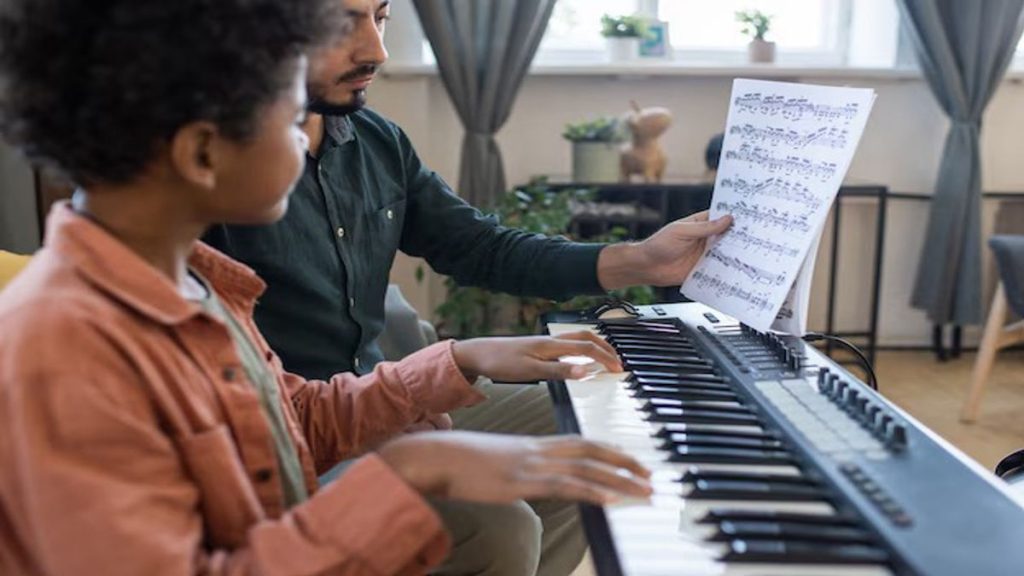Introducing children to piano lessons offers far more than just learning how to play an instrument. It opens doors to a world of growth that shapes their personality, emotional well-being, and cognitive skills. Piano classes create an engaging environment where kids develop discipline, patience, and a sense of achievement. These early musical experiences can significantly impact how children perceive challenges and build their confidence in various aspects of life. Beyond the notes and rhythms, piano lessons nurture creativity and offer children a powerful way to express themselves. We will explore how piano classes for kids help build confidence and unleash their creative potential, offering a foundation for lifelong benefits.
How Piano Classes Foster Confidence and Creativity in Kids
- Enhancing Self-Discipline and Goal-Setting Skills
Piano lessons naturally encourage children to develop self-discipline as they practice regularly to improve their skills. The process of learning to play a piece of music requires focus, repetition, and dedication. As children achieve small milestones, such as mastering a new song or technique, they experience a sense of accomplishment. This success reinforces their confidence and motivates them to take on new challenges. The goal-setting nature of piano learning also helps kids understand the value of setting objectives and working steadily towards them. These skills often transfer to other areas of life, including academic performance and personal growth, giving children the confidence to pursue their ambitions with determination.
- Cultivating Emotional Expression and Creativity
Playing the piano allows children to connect with their emotions and communicate feelings that might be difficult to express through words alone. Music serves as a creative outlet where kids can experiment with sounds and develop their own style. This freedom to explore nurtures imagination and inventiveness, laying the groundwork for creative thinking in other areas. Creativity is not limited to the arts; it is a vital skill for problem-solving and innovation across disciplines. Piano classes encourage children to listen carefully, interpret music, and add their unique touch to performances, boosting their confidence in their creative choices and helping them appreciate the value of original thinking.
- Improving Cognitive Abilities and Academic Performance
Learning to play the piano engages multiple areas of the brain, enhancing memory, spatial reasoning, and coordination. Research shows that children who take music lessons tend to perform better in subjects like mathematics and language arts. This is because music education strengthens neural connections and encourages critical thinking. As children practice reading sheet music and synchronizing their hands, they develop skills that improve concentration and multitasking. The increased mental agility gained through piano classes builds a foundation of confidence in their ability to learn complex concepts and tackle academic challenges successfully.
- Building Social Skills and Teamwork
Though the piano is often seen as a solo instrument, piano classes provide opportunities for social interaction and collaboration. Group lessons, recitals, and ensemble performances help children learn how to work with others, listen attentively, and share experiences. These social settings encourage kids to communicate their ideas and receive constructive feedback, which boosts their self-esteem. Participating in performances also teaches children how to manage stage fright and develop poise in front of an audience. These experiences build social confidence and prepare children to engage comfortably in group settings throughout their lives.
- Developing Patience and Resilience
Mastering the piano is a gradual process that requires time and perseverance. Children learn that progress is not always immediate, and setbacks are part of growth. Through consistent practice and overcoming challenges, kids develop resilience and a healthy attitude toward failure. This ability to persist despite difficulties enhances their confidence and encourages a growth mindset. Understanding that effort leads to improvement empowers children to approach other areas of life with patience and optimism. Piano classes instill the understanding that success often requires sustained effort, which is a valuable life lesson.
- Encouraging a Lifelong Appreciation for Music and Culture
Exposure to piano music introduces children to a wide variety of musical genres, styles, and cultural traditions. This broadens their horizons and cultivates an appreciation for the arts that can last a lifetime. As children discover music from different parts of the world and historical periods, they develop curiosity and open-mindedness. This exposure enriches their creative thinking and builds confidence in exploring new ideas and experiences. A lifelong relationship with music can also provide ongoing emotional support and a means of relaxation, contributing to overall well-being.
Piano classes offer much more than the ability to play an instrument; they provide children with valuable tools to build confidence and unlock creativity. From enhancing self-discipline and cognitive skills to fostering emotional expression and social abilities, learning piano supports comprehensive personal development. These lessons empower children to approach life with resilience, curiosity, and a positive mindset. Encouraging kids to engage with music through piano education sets them on a path toward greater self-awareness and creativity, benefits that extend far beyond the keyboard.

